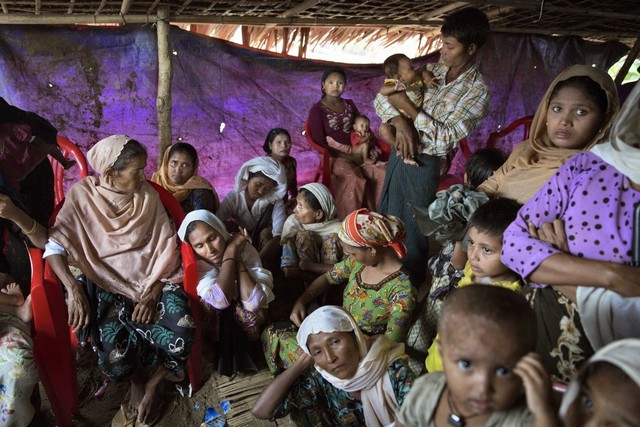By Francis Khoo Thwe
The Myanmar government wants to censor the pope and Card Francis Charles Bo, Myanmar’s first cardinal, with regards to the term “Rohingya” insofar as it is used in relation to the Muslim minority in Rakhine State, western Myanmar, a group that has been subject to abuse and persecutions for years. As the country prepares for general elections on 8 November amid growing sectarian and racial tensions and open fighting with ethnic minorities, it is becoming increasingly clear that the pledges made in the past about progress in human rights, as well civil and political rights after decades of a brutal military dictatorship, are no longer a priority.
Pope Francis is one of the few world leaders to have spoken about the plight of Myanmar’s Muslim minority, and this on several occasions, referring to them as ‘Rohingya,’ a term unpopular with Myanmar’s rulers. The matter came to the fore before the archbishop of Yangon left for Rome to attend the Synod on the family. According to Burmese language Mizzima News, officials at the Myanmar Ministry of Religious Affairs approached the cardinal to ask him not to use the word “Rohingya” in the presence of Pope Francis when he is at the Vatican. Some Ministry officials “recently came to meet me regarding the term of ‘Rohingya,’” said Card Bo. “The Religious [Affairs] Minister wanted to meet me,” he explained, “but so far I haven’t met him”. “If the word Rohingya is used,” people will associate them with Rahkine State, which is what the authorities do not want. For this reason, they are pushing for the “term Bengali or Muslim from Rahkine State.”
The “situation there is very crucial,” Card Bo said. “I think that we have to solve this problem before it becomes too prolonged, before there is more violence,” also in relation to “international terrorism and other things.” When asked if he would use the term in front of Pope Francis he said he would use “Rohingya to indicate [the issue]” but would address the people as Muslims from Rahkine state because of the sensitivity of the subject. At the same time though, he said that he refuses to use the term “Bengali” for those who identify as Rohingya because their families have been in the country for over a century.
This attempt at censorship by the Myanmar government confirms once more the climate of ethnic and sectarian tensions that currently prevail in the country. The controversial laws advocated by Buddhist extremists against mixed marriages, conversions, adultery, and polygamy are starting to have their first negative effects.
Sources told AsiaNews that mixed Buddhist-Catholic families have stopped sending their children to catechism and to church for the sacraments. Fearing possible repercussions, bishops have ordered a stop to marriages involving mixed couples. Married couples from mixed backgrounds are already facing problems.
Recently, a convent of nuns was attacked and devastated in the city of Nyaungwon. Residents ransacked the monastery and destroyed everything, forcing the nuns to flee, after a 14-year-old Buddhist teenager was accused of killing a 4-year-old Buddhist boy whose body was found on church ground. Appeals for calm by the country’s bishops have had no effect so far. A witness said that in this climate, it is “no longer possible” for the Catholic community “to provide help and assistance to the poor if they are Buddhist.”
Christians also risk being accused of forced conversion because young people of other faiths go to Catholic schools. “The situation is becoming more difficult,” said the source, anonymous for security reasons. A Buddhist extremist movement is behind the escalating sectarian and ethnic tensions. According to well-informed sources, the group is operating with the approval of the country’s highest political authorities, in particular the military, who still hold real power in Myanmar. The climate of fear and tensions has not spared Buddhists, many of whom oppose the recent laws passed with the support of the main opposition party, Aung San Suu Kyi’s National League for Democracy (NLD).
The government’s decision to release common criminals and murderers whilst keeping political prisoners behind bars has made matters worse. Sources told AsiaNews that the military and the government are pursuing a strategy designed to increase tensions in order to discourage voting. At the same time, vote rigging appears to be well underway (with some people left off voters’ lists whilst the names of dead people are included inothers). “All these moves have one purpose: prevent Aung San Suu Kyi’s party from winning,” said the source. “The regime wants to divide people in order to hold on to power.”
2 October 2015

